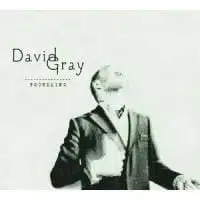
Part, if not all, of David Gray’s appeal comes from his sadness. Rarely was there a moment of happiness on his blockbuster smash, 2001’s White Ladder. Even when the tone was cheery or the lyrics suggested pleasantry, he kept a firm grip on his macabre nature with slower tempos, minor piano or guitar chords, and a voice so honest that it would be impossible to not focus more on the cynicism peering through each of his words over the fact that he was singing the word “Babylon” a little funky.
And that’s why the English singer’s latest effort, Foundling, shouldn’t surprise many of his hardcore fans. Sure, it’s a bit deeper than his previous efforts, and yes, to say the recordings are merely “stripped down” would be an act of understatement in its truest form. But to love David Gray, one must love the guy for who and what he truly is: sad.
“I’m as proud of it as anything I’ve done,” Gray told The Guardian in a recent interview when asked about Foundling, an album he opted to release in the wake of the news that plans for a reissue of his previous album, Draw the Line, had fallen through. But even with that said, he couldn’t help himself from pulling back a bit, offering up a candidate for quote of the year quickly thereafter: “This record is going to disappear off the face of the Earth, bar some freak occurrence.”
Moments like that remind us exactly how unhappy the crooner can be. And, truth be told, those kinds of moments are scattered throughout his latest effort more often than they have been on any one of Gray’s eight previous releases. Songs such as “Forgetting” and “When I Was in Your Heart” are two prime examples. The former features a quieter-than-ever Gray sitting down at a piano to offer multiple singular words that end in “ing” on a track that oozes with pretension. That’s OK, though, as the singer’s delicacy and honest delivery make what’s seemingly a novelty stunt appear a bit prettier than it would had, say, John Mayer tried the same thing. Trading in his piano for an acoustic guitar on “When I Was in Your Heart”, though, Gray bounces back to his old tricks, displaying sunlit tones underneath his depressing words. The high harmonies displayed midway through the song only instigate more feelings of brightness before reality strikes again and the Englishman’s lyrics swiftly return to heartbreak and loss, two things he clearly has a great deal of experience with.
Oddly enough, and with all of the above said, what sets this particular release apart from other David Gray records is, well, the amount of sadness conveyed throughout. While the artist’s records have always been lovely to listen to on a cold rainy day, there have always been tracks like “Stella the Artist” or even the moderate hit “Please Forgive Me”, songs that suggest that life’s unfortunate experiences can sometimes be overshadowed by the goodness that can indeed be found in such things as love, relationships, friends, family, and simply living itself. None of that optimism appears on Foundling.
“The Old Chair”, another piano driven track that eventually allows a tiny amount of irrelevant drums into the party, is sadness at its saddest, featuring nearly every single line ending with Gray’s voice tailing off into hopelessness. “A New Day at Midnight” finds the singer tackling such an obtuse notion as guilt before reaching a crescendo toward the end as he repeats, “Oh my word, I…” louder and louder, ultimately never finishing a sentence he was once so sure about. And “Davey Jones’ Locker” features more of what the previous ten tracks did, while adding a little more of a backing band and a build-up that finally boils over around the 2:30 mark.
None of this is said to suggest that Gray isn’t interesting at times on Foundling, though. The album’s title track is its best. Though it admittedly still maintains a dark, atmospheric backdrop, the song features a haunting accordion and a tasteful, simplistic use of hand drums that sees the record find a groove for the first and only time on its 11 tracks. And “Only the Wine” proves to be the only effort here that could realistically be found on any previous effort that the singer has offered, especially the aforementioned Draw the Line. The track is more upbeat than anything else it’s surrounded by, with the refrain proclaiming that it’s “only the wine talking” cute in and of itself. It’s also the only moment of Foundling that isn’t completely engulfed in depression.
Many people will and already have dismissed this effort as a throwaway release — hell, you saw what Gray himself said. Many may claim it’s just a bit too sad, too slow, too boring. But if sad, slow, and, yes, even boring (at times), weren’t things that factored so much into David Gray’s career to this point, there is no way he would be nearly as successful as he has turned out to be. It’s not that Foundling is overtly any of those things more than they are others. It’s just that it’s more visible here than it has ever been before. Hey, even the sad guys sometimes have to take some time to be sad. And if this release is David Gray’s self-loathing moment of pure, unabashed misery, that’s OK. Besides, where would all of that appeal go if he ever decided to get happy?

